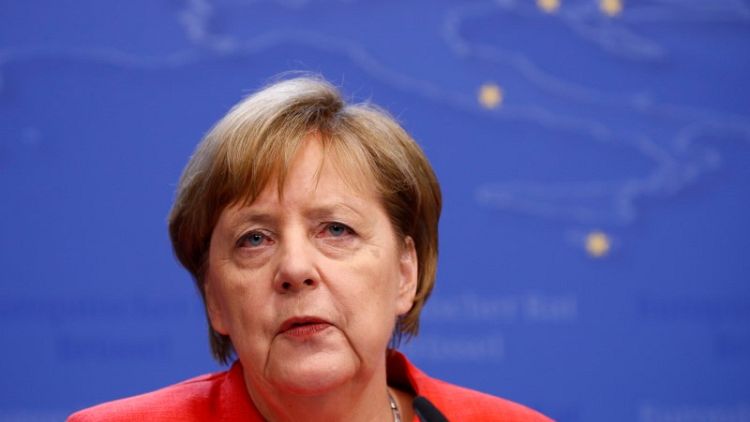By Thomas Escritt and Andreas Rinke
BERLIN (Reuters) - German Chancellor Angela Merkel said deals on migration she had brought home from Brussels should be enough to satisfy her restive Bavarian allies, who were gathering in Munich on Sunday afternoon for a meeting that could decide her political fate.
Nine months after elections that saw her lose votes to the far right, a weakened Merkel was forced to turn to European Union neighbours to help resolve a conflict with her allies after they rebelled against her immigration policy.
The party's leader, interior minister Horst Seehofer, threatened to turn migrants back from the Bavarian border, a move that would almost certainly precipitate a government collapse.
At a Brussels summit this week, leaders hammered out a deal to share out refugees on a voluntary basis and create "controlled centres" inside the European Union to process asylum requests.
In an interview with ZDF television, Merkel said the formal agreements and verbal commitments she had secured from her EU partners would have the migration-stemming effect the CSU wanted to achieve, but in a more European-minded fashion.
"The sum of all we've agreed is equivalent to what the CSU wants - that's my personal view, but the CSU must decide for themselves," she said.
"It is also sustainable and in accordance with the European ideal. Europe is slow, and we aren't yet where we want to be... In my view Europe will be held together, otherwise free movement could have been in danger," she added.
A document circulated by Merkel to coalition allies on Friday night outlined repatriation agreements with 16 countries and proposed reception centres in Germany where migrants would undergo an accelerated asylum procedure -- measures that represent a significant hardening of her 2015 open-door asylum policy.
RIGHT DIRECTION
But the Czech Republic, Poland and Hungary, whose Prime Minister Viktor Orban has long sought to position himself as Merkel's nemesis in the immigration debate polarising the continent, later said they had signed no bilateral agreements on repatriation.
The CSU's leadership were tight-lipped as they arrived at their party's Munich headquarters to discuss Merkel's deals. But earlier, Bavaria's premier Markus Soeder, mindful of October regional elections in which he faces a stiff challenge from the anti-immigration Alternative for Germany (AfD), was positive.
"It goes absolutely in the right direction," he said, but added he would keep up the pressure to obtain more clarity on the details.
While most analysts expect Merkel to survive the clash with the CSU, it is unlikely to be the last occasion on which the sister party seeks to distance itself from a chancellor it sees as too centrist for its own supporters.
The document circulated by Merkel to her coalition partners after the summit said 14 countries had agreed "on a political level" to take back some migrants who had passed through other EU countries on their way to Germany.
"I understand that this is a dramatic attempt to save her own position, but absolutely there is no agreement" Jacek Sasin, a senior Polish government official said on public television on Sunday.
In the interview, Merkel said she regretted any misunderstandings, but that she had been given "political commitments", and had not said any deals had been signed.
(Reporting by Andreas Cremer, Victoria Bryan and Tom Koerkemeier in Berlin and Agnieszka Barteczko in WarsawEditing by Robin Pomeroy and Raissa Kasolowsky)


